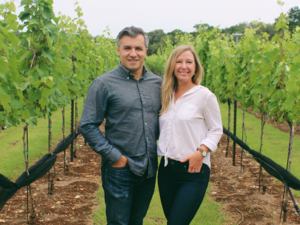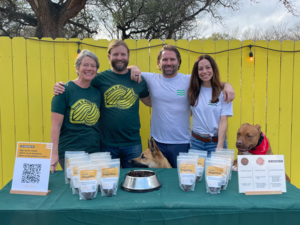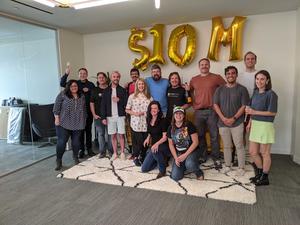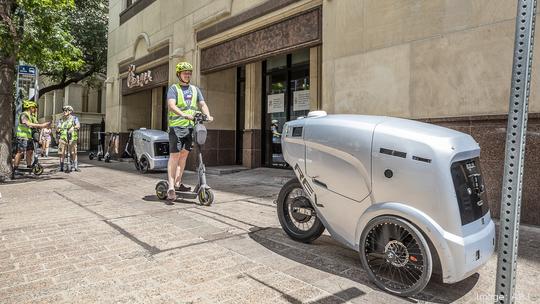
Silver robots navigate the streets of downtown Austin, carrying sustenance to the hungry. No, this isn't a scene from a sci-fi film — it is the handiwork of a relatively new Austin startup that marries food delivery and technology.
Refraction AI Inc. uses self-driving robots, resembling large coolers on wheels, to deliver food from restaurants, groceries and even items from retail stores to offices and homes.
The company's electricity-powered robots cut down on the environmental and financial costs of delivery, CEO Luke Schneider said. It began in March delivering meals from the downtown Chick-fil-A at Sixth Street and Congress Avenue. Atlanta-based Chick-fil-A Inc. is expanding that partnership, with plans to launch in late June robot delivery from its store at 503 W. Martin Luther King Jr. Blvd.
It's a significant step forward for the Austin company — one that garnered national headlines.
"Autonomous delivery using Refraction's robots creates an exciting new opportunity to extend the Chick-fil-A experience to a growing number of delivery guests," Luke Steigmeyer, operator of the downtown Chick-fil-A, said in a statement. "The platform will allow us to provide fast, high quality, and cost-effective meal delivery within a mile radius of our restaurant all while helping to keep the community we serve environmentally clean and safe."
Additionally, Refraction AI handles some deliveries for Newk’s Eatery, Modern Market and Two Hands in Austin. The company also handles deliveries that come through Olo, a digital ordering service. Back in mid-2021, it rolled out delivery with Southside Flying Pizza.
Some of the time, the Refraction AI robots are controlled remotely by tele-operators, while at other times they operate entirely autonomously.
"Our primary concern in any situation is safety," Schneider said. "We combine the modes in a way that balances our objectives (speed, cost, timing, etc.) as we expand our reach throughout a given area."
Refraction AI also has robots driving around Ann Arbor Michigan, where the company was founded in 2019 and still has a technology development center. But its future runs through Austin, where the company relocated its HQ last year and has the majority of its commercial operations, according to Schneider. Plans to expand to even more markets are in the works.
The company now has 50 employees, and Schneider anticipates hiring more. On its career website, the company lists nine openings, with seven of those in Austin.
Refraction AI offers businesses a fleet of robots exclusive to their stores. It handles technical services and helps companies integrate into the systems used to process inbound orders.
Refraction AI has dozens of robot fleets so far, but declined to specify the exact amount. Schneider aims to soon have have hundreds of operational robots, and then thousands. The CEO said the business is even receiving requests from cities to serve retirement communities through grocery delivery.
One of Refraction AI’s strongest partnerships is with Chick-fil-A, a deal that came together late last year after the startup was approached by the fast food chain. The customer response has been “overwhelmingly positive,” Schneider said.
“We were flattered to be selected to do the work with them because that's essentially what they're entrusting us with, in a really new and exciting kind of space that didn't really exist before,” Schneider said.
The Refraction AI robots are often followed by product development associates on scooters, to gauge interactions between the vehicles and humans, assess routing algorithms and act as robot ambassadors for curious bystanders. Schneider said the company "will always rely" on some workers in the field to refine the customer experience but that these roles are "already becoming more specialized, more focused."
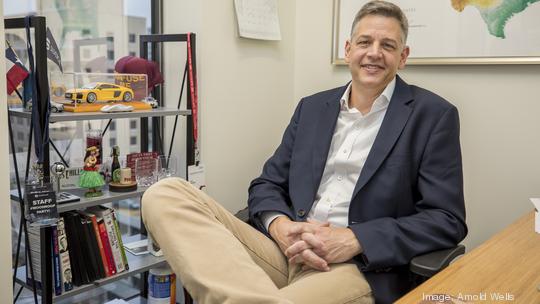
Hoping to break into other industries
Schneider was previously CEO of Silvercar, a high-end car rental service that allows customers to skip the line and do everything through a mobile app. The company was acquired by Audi in 2017. Schneider is putting knowledge gleaned from Silvercar to good use, including the need to find customers in multiple categories and multiple segments.
Refraction AI has demonstrated it works in the restaurant space but it wants to break into grocery delivery as well, with a slightly larger robot that can go faster and farther and carry about seven grocery bags.
“We are looking for what we would call a pedestal customer in each of these segments,” Schneider said. “Somebody that has a really strong, demonstrated need for robot delivery.”
The pandemic made delivery essential and many technologists predict robots that handle the last mile of the process will become a common facet of everyday life. These robots exist in other cities, and even in Austin this is not the only company operating in the space. Los Angeles-based Coco in early March launched remote-piloted delivery vehicles in Austin. At the time, LA Inno reported that 10 Austin merchants were on board, such as Bamboo Bistro and Aviator Pizza, and that the vehicles could deliver within a two-mile radius.
As Schneider noted, Coco is intended for sidewalk travel, while Refraction AI vehicles travel in a bike lane or in the margin of the road. He said it’s difficult for robots to co-exist with humans in pedestrian areas, pointing to regulatory debates around the country.
Refraction AI's REF-1 robot has a delivery radius of half a mile to five miles.
While the Refraction AI tech has the potential to replace delivery jobs, Schneider does not see it having a large impact on the labor market. If anything, he says, it may open more opportunities.
While these kinds of robots would replace some delivery drivers, many of those roles have already been absorbed by the gig economy. Rising gas prices and overall inflation are also making these kinds of jobs harder to fill.
"We are a combination of autonomous robots and tele-operators; people who drive remotely,” Schneider said. “The difference is one of our tele-operators can manage multiple robot deliveries. And they can also do it in a safer environment.”
Refraction AI said it has more than 100 partnerships in the works nationally, although it declined to name potential customers. In the next year, the company hopes to establish customers in its three core segments of delivery, expand its fleet and grow as fast as possible based on the capital it raises. It has raised a little more than $12 million in venture funding since its inception, Schneider said.

